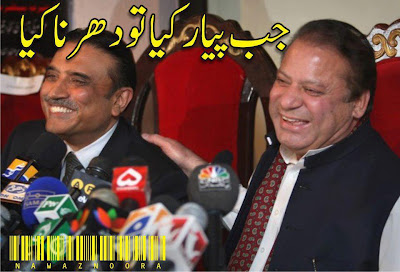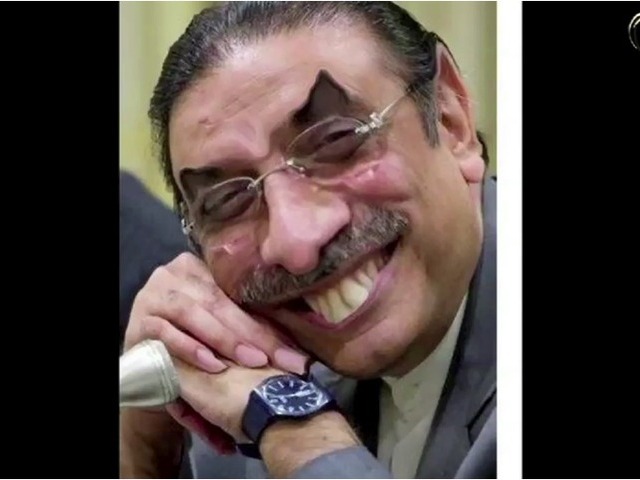Ankit Purohit
Senior Member
- Joined
- Jun 20, 2012
- Messages
- 1,082
- Likes
- 667


..............
Wah What a Art ................is me tou ye jyada kamina Aur Tharki Lagta hai




..............


after death of his wife,that bold part is obviousWah What a Art ................is me tou ye jyada kamina Aur Tharki Lagta hai
what about the 8 years that he was in jail?after death of his wife,that bold part is obvious
BTW those are no1 pre-requisites of being a good politician
All thugs are getting ready in Pakistan including Mushi.
I think Kadri with Missile as election symbol will win.
Ofcourse with the blessing of ISI and PA....................



he is american citizen. sooch lo farhaan bhaiI would rather support dr ishrat hussain.
a better candidates..though we will adjust with even hafeez sheikh for the next 50 days
doesnt matter..jab 5 saal guzar gye to ye 50days bhi guzarr hi jayengehe is american citizen. sooch lo farhaan bhai
These 50 days are more crucial and bloody as compare to last 5 yrs.doesnt matter..jab 5 saal guzar gye to ye 50days bhi guzarr hi jayenge
they are not.though as i said my first choice is Dr ishrat hussain.These 50 days are more crucial and bloody as compare to last 5 yrs.
what you think will zardari leave pakistan on 16 night??? As he will not be president at that time and he has several cases against him,may be arrest warrantsthey are not.though as i said my first choice is Dr ishrat hussain.
lets see what happens..tomorrow night the govt will step down
No zardari will remain president till sept.what you think will zardari leave pakistan on 16 night??? As he will not be president at that time and he has several cases against him,may be arrest warrants
This election will decide the future of PakistanWill Pakistan fail or find strength to start over?
Will Pakistan fail or find strength to start over? | Asia | DW.DE | 14.03.2013
As Pakistan gears up for elections, DW's Grahame Lucas analyzes a country at a crossroads.
From the West's point of view, Pakistan's situation ahead of the impending elections seems just as critical now as when the dictator General Pervez Musharraf resigned in 2008. The current government might have managed to survive a five-year term without there being a coup - a first for an elected government in Pakistan - but the results are meager and the great hopes have been dashed.
Five years after the democratically-elected government came to power, Pakistan is still considered one of the most dangerous countries in the world. Frequent terrorist attacks on government posts, army personnel or members of Pakistan's Shiite minority have cost hundreds of lives in the northwestern tribal areas and the province of Baluchistan on the border with Afghanistan and Iran. The security forces have not been able to get the Pakistani Taliban and other Islamist groups under control and bring an end to their jihad. Christians are also frequently threatened with the country's blasphemy legislation being used against them. Courageous young women who demand their rights, such as Malala Yousafzai, risk their lives. A tolerant country looks different.
Terrorist groups such as the powerful Lashkar-e-Taiba have been able to count on the support of the powerful secret services (ISI) in recent years and continue to cause harm. The Pakistani "masterminds" behind the Mumbai attacks of 2008 are still free. Terrorist attacks are frequent in Pakistan's cities. And politicians' fears of becoming the target themselves as well as the public's broad support of Islamist groups prevent them from speaking out.
The government's fainthearted efforts at the beginning of its term to bring the Pakistani secret services under civilian control failed when the army vetoed this idea. The ISI and the army continue to pursue their own traditional interests with regard to Afghanistan and India. Attempts by politicians in Islamabad to build up closer interests to India have come up against the army chief's reservations. After five years in power, Pakistan's politicians have not managed to bring the "state within the state," which also controls the country's nuclear weapons, under control.
The attempts to make progress in domestic policy have also been largely in vain. The economy is idle and the country depends on international financial aid. Without the billions of dollars from the US, Pakistan would long have gone bankrupt. There is crushing poverty. The power supply situation is disastrous hindering the country's economic output daily. There are no funds for the health system. Millions of young people have little access to education and are thus sent to madrassas, or Koran schools, where they easily fall into the hands of Islamists. Most teenagers have little chances of receiving training. And censorship continues to prevent a public debate about these problems in the media. A democracy looks different.
Most Pakistanis cite corruption at every level of society as the reason behind this catastrophic situation. Let's not forget how the country's feudalistic establishment, comprising the richest 200 families in the country, and corrupt government officials put into their own pockets the international aid for the flood victims in 2010 and 2011. Instead of concentrating on developing a functioning party system, President Asif Ali Zardari - nicknamed "Mr 10 percent" because of his alleged corruption in the 1990s - is doing his best so that his son Bilawal becomes the new head of the Bhutto dynasty. He wants the 24-year-old to take over his mother Benazir's legacy, five years after she was assassinated by extremists. This does not seem very promising.
If one digs hard, one can find an element of hope in Pakistan's blossoming civil society.
The judiciary has played an unusual role in recent years. The Supreme Court was responsible for Musharraf's demise and since then two prime ministers who were reluctant to bow down to the rule of law have been forced to resign. Judges have shown that they are not afraid of confronting Pakistan's powerful military. These guardians of the constitution have been a thorn in the side of the ruling class - including Zardari - and have campaigned incessantly for a state based on the rule of law. Many Pakistanis have thus scraped up some hope from Pakistan's courts.
From the perspective of history, this is still a very short episode but lawyers and their supporters in civil society can develop their position. They are tenacious. And they are acting according to the approach of Pakistan's founder Muhammad Ali Jinnah who wanted a functioning parliamentary democracy.
One can only hope for the country that the judiciary will manage in a few weeks' time to ensure that the elections are free and fair, so that Pakistanis get another chance to encourage their democracy to prosper, even if this is a slow procedure. It can also be hoped that Pakistan will one day have leaders who are prepared to take a new direction in both domestic and foreign policy to ensure regional security and cooperation.
The West must also be prepared to recognize such a development and move beyond stereotypes of the country as the home of terror. When the time is ripe, it must provide the support and means so that Pakistan - just like Germany after the Second World War - can get back on its feet.
This election will decide the future of Pakistan
future is safe if imran khan or even the Nawaz is selcted..since Musharaf is out of equation because of his party.
if PPP selected again.than Allah hafiz Pakistan ka
Jaali not Zaali**there are chances as there are 4 crore ZALI vote in pakistan, zardari knows how to buy votes
Why are you Pakhtoons and Punjabies so much against PPP ??Jaali not Zaali**
zardari might know but even zardari son dont want to vote for PPP .
